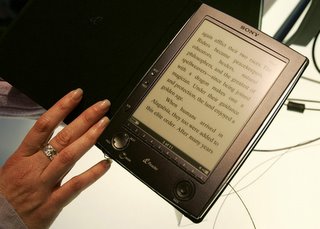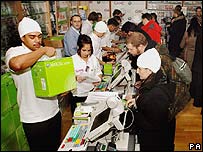
As I write this, Charles Kennedy, leader of the Liberal Democrats, is resigning before a media pack inside 4 Cowley Street. His speech is workmanlike, no tears, no room for unnecessary sentimentality. Surprising really, for a man on his knees. A few days ago he admitted he had a drink problem, pre-empting an ITN news story that was about to go live. It is Saturday today, usually a very quiet day for news. Now I’m in for a late night. I can’t complain. I bet Charlie didn’t get one wink last night, as he toiled and turned in his sheets, deliberating on accusations from his own party that he was a dead man walking.
It’s been a surprisingly busy week, considering it’s the first after the holiday break. Political hacks have had a tough one with the Liberal Democrat leadership story and Israeli Prime Minister Ariel Sharon teetering on the brink. And those with a vested interest in the technology industry will not have had much time to get back in to the swing of things either. The Consumer Electronics Show has already thrown up some extremely interesting gadgets worth salivating over, and one in particular has caught the eye.
Sony boss Howard Stringer revealed the Sony Reader on Friday, a handheld device made with . . . wait for it . . . e-paper. It will facilitate the download of digital books viewable on a super-crisp, six-inch black and white screen, which is as easy to read as a normal newspaper, and is about the size and weight of a paperback.
I deliberately used the word newspaper, because the announcement marks the beginning of the e-newspaper as a viable product. The technology used for the Sony Reader is by no means the most advanced (companies are using e-ink in colour and on flexible screens), but the confidence Sony has in the portable digital reader format is encouraging.
Sony has begun by signing deals with book publishers, but expect initiatives over the coming months with newspaper and magazine publishers. Via wi-fi, users can download their morning paper direct to their digital portable device, wherever they are. The end of the inky finger?
What does this mean for journalism? There are many, but one pertinent one is the death of the deadline, paradoxically because the immediacy of web-based publishing means there will be rolling deadlines every second. Speed is of the essence, as it is now with 24-hour news channels. Shift workers on the Evening Standard who think they've got it hard now won’t know what’s hit them.
Could this have a detrimental knock on effect on quality, as hacks scramble to beat their rivals to publish? Quite possibly. It’s down to journalists then to raise their game, to do what they do, to the high standards enshrined in the responsibility they have, even quicker than before. For the consumer, the Sony Reader marks the beginning of digital news 24 hours a day. For the media, the Sony Reader marks the beginning of the 1000mph journalist. Weeeeeee!




